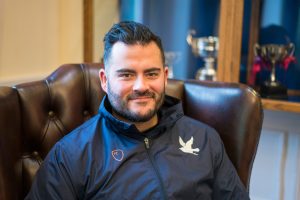 Patrick (Ricky) Skene took up ice hockey whilst he was at school and after his GCSEs went to a college that would allow him to continue to play ice hockey on the side. Patrick decided to go to university to study Sports Psychology, but after realising that he wasn’t going to be accredited as a Sports Psychologist through the course he decided to leave and focus on a professional career as an ice hockey player. Whilst enjoying a successful ice hockey career, Patrick started up a strength and conditioning business on the side. Once he had retired from professional ice hockey, Patrick decided to make his business his full focus, but after being told that he should consider teaching by some clients he began to investigate that as a career option. Fast forward to 2017 and Patrick is in his second year of his full time OU degree, working full time as a games teacher in an independent school and working hard to achieve his goal.
Patrick (Ricky) Skene took up ice hockey whilst he was at school and after his GCSEs went to a college that would allow him to continue to play ice hockey on the side. Patrick decided to go to university to study Sports Psychology, but after realising that he wasn’t going to be accredited as a Sports Psychologist through the course he decided to leave and focus on a professional career as an ice hockey player. Whilst enjoying a successful ice hockey career, Patrick started up a strength and conditioning business on the side. Once he had retired from professional ice hockey, Patrick decided to make his business his full focus, but after being told that he should consider teaching by some clients he began to investigate that as a career option. Fast forward to 2017 and Patrick is in his second year of his full time OU degree, working full time as a games teacher in an independent school and working hard to achieve his goal.
“I was born in Chicago where my older brother took up one of the national sports of ice hockey. We stayed there for about 5 years and then moved over to the UK. That’s when I picked up ice hockey and just followed my brother’s footsteps – he was always an inspiration to me. Whilst I was doing my GCSEs I was also being taken out of school to pursue ice hockey as it was a minority sport here and still is. After my GCSEs I immediately went to college at Nescott as that allowed me to continue to play ice hockey. After college I began a degree in sports psychology, however, during one of the first year lectures we discovered that we wouldn’t be accredited as sports psychologists at the end. I didn’t really want to carry on with another two and a half years of student debt, so I stopped that. I had to make a choice at that point whether to pursue my career as an ice hockey player or to keep focus on my educational interests, and I decided to go down the professional ice hockey route.
At the same time that I was playing ice hockey I also completed some vocational courses. I took premier training for a PTI diploma in advanced personal training and surrounding that I also did CrossFit because it was just coming over to the UK. I completed my CrossFit level 1 and 2 instructor’s award and then my CrossFit gymnastics award on the side. I started to realise that I quite liked doing little vocational courses, gaining CPD points and dipping into different things that I liked, but these little courses didn’t carry any qualifications and were just more out of interest.
As I was playing ice hockey at a professional level I had to start to tailor them down a little bit and concentrate on that. My career took me from the Slough Jets to the Guildford Flames and I played 9 years for them. That was really where I made a mark as an ice hockey player; I enjoyed a lot of success, won some trophies and towards the end of my career I started to think about what I was going to do afterwards. I was always quite a fit player, I liked to take my strength and conditioning very seriously and I had been training a lot of my team mates, so I figured why not put the two together. My Premier Training diploma gave me my first CPD points and with my REP level 3 I created my own personal training and strength and conditioning business. When it first started I was taking junior athletes from amateur right the way through and showing them what was required to become professional. I ended up having my professional ice hockey career and a strength and conditioning business on the side until finally I decided to retire from ice hockey to focus on the coaching of not only athletes, but also the general public. I liked it, but realised that if I had a sick day then I didn’t get paid and if I went on holiday then it was costing me money. Some of the people that I was training encouraged me to think about teaching as a career because they said I’d be very good at it.
I looked into the possibility of teaching but found that my diplomas weren’t quite enough to go straight into teaching. I’d heard about The Open University and had seen some advertisement for it so decided to enquire about courses and through that found the BSc Sports, Fitness and Coaching degree. I enrolled with The Open University and started the first year with the strength and conditioning business on the side. I was then pulled out of ice hockey retirement by a coach friend of mine who needed some injury cover, so I came out and played for Telford Tigers for the final time. I enjoyed some more success and retired winning the cup and the league for a final time. It seemed like the perfect time to completely retire and devote everything into this degree and teaching.
I funded the first year myself by paying upfront and then intended to pay for the second year in the same way, but through speaking to the bursar at the current school that I’m at and speaking with the headmaster, they were able to provide me with financial assistance. My study was like inset training because it was enhancing my performance as a games teacher on the job, so they are supporting my funds for the second year. Even though I’m receiving financial support I knew there were options available if I didn’t – I knew I could pay for it in instalments or defer for a while.
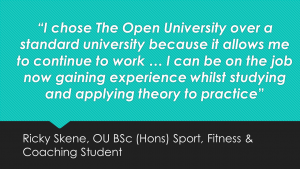 I picked the sports, fitness and coaching degree because I do have a background in that industry, so I felt being away from study for so long I wouldn’t be coming in cold and completely out of my element. I chose The Open University over a standard university because it allows me to continue to work and, rather than approaching a school in three years’ time, or even longer if I’d done it part time, I can be on the job now gaining experience whilst studying and applying theory to practice. Also, when I do finish I’m then three years ahead of the curve.
I picked the sports, fitness and coaching degree because I do have a background in that industry, so I felt being away from study for so long I wouldn’t be coming in cold and completely out of my element. I chose The Open University over a standard university because it allows me to continue to work and, rather than approaching a school in three years’ time, or even longer if I’d done it part time, I can be on the job now gaining experience whilst studying and applying theory to practice. Also, when I do finish I’m then three years ahead of the curve.
Obviously gaining the theoretical knowledge for the course is fantastic, but being able to manage your time more effectively is huge as a teacher because we do work long hours, we do have high demands on our time and there’s always 101 things going on, so that’s one of the life skills that I think the OU teaches you. It works well for me because we’re given a timetable which I can follow and it’s very manageable. The work is split into small bitesize chunks for each week so you’re not just looking at the book and having to read the entire thing. For me it was just small goals and small manageable steps that I could just apply directly into my job as a teacher.
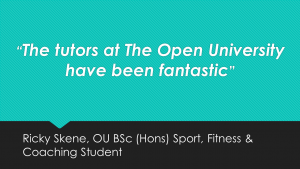 The tutors at The Open University have been fantastic. I’ve had many different jobs leading up to where I am now as a teacher and with that things change, there’s lots of variables and deadlines sometimes can creep up on you even if you are following a timetable, so being able to email the tutors directly was great. I didn’t have any instances where they questioned it, they said ‘what do you need to be able to produce the work and how can we help’ and that’s exactly what they did in those cases. They would give me a week’s extension, which would be a perfect amount of time to do it, or they would direct me to a resource or an online source of material that would help me get back on track if I was finding something difficult.
The tutors at The Open University have been fantastic. I’ve had many different jobs leading up to where I am now as a teacher and with that things change, there’s lots of variables and deadlines sometimes can creep up on you even if you are following a timetable, so being able to email the tutors directly was great. I didn’t have any instances where they questioned it, they said ‘what do you need to be able to produce the work and how can we help’ and that’s exactly what they did in those cases. They would give me a week’s extension, which would be a perfect amount of time to do it, or they would direct me to a resource or an online source of material that would help me get back on track if I was finding something difficult.
Probably the biggest highlight is seeing your hard work pay off! At the beginning of the year my grades weren’t quite as I expected, so to see those grades steadily improve as the year went on wasn’t an instant highlight, but it was the long game. Progressing to a point where I felt more comfortable writing my assignments and having my scores reflecting that made me quite happy because it showed the hard work was being rewarded.
My favourite topic so far is definitely E233 Sport and Fitness Psychology – a case study approach, which I’m studying now. I’ve done so much of the physical side of sport and fitness development but hadn’t really dealt with the psyche and psychological side of it and so I found that really interesting. It’s also helped not just with myself, if I’ve been getting stressed or anxious, but being inside a school and as a teacher it’s been immense because it’s allowed me to apply all of that theory into practice and actually see it work or see if I need to understand it more. I think each of my lessons are getting better and my growth is being shown now from that one module.
One of the perks about choosing the Sports, Fitness and Coaching degree through The Open University is discovering that you got CPD points for it because as a teacher I knew that you had to continually get these CPD points. It helps with your CV, it helps you move up the chain and it helps you to offer different areas of expertise to the students. At Danes Hill we try to offer the kids everything they could possibly think of, so keeping my CPD points going along with the various modules that the course is offering me was great. It was a huge bonus to realise that although I’m away from doing the little vocational or extracurricular courses that I was doing and focusing on three years in one direction, I’m still keeping my CPD points going.
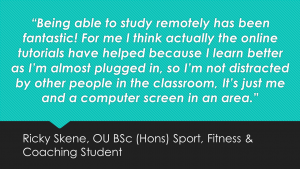 My main reason for choosing The Open University was because of the distance learning type of study. It allowed me to continue to work so that I could fund other interests and hobbies and I’ve been able to go on and buy a house. Being able to study remotely has been fantastic! For me I think actually the online tutorials have helped because I learn better as I’m almost plugged in, so I’m not distracted by other people in the classroom, It’s just me and a computer screen in an area. When I’m at home I’ve got a desk area, so everything there is what I need to study, if I’m at school then we’ve got work rooms and if I’m on the go completely remotely I’ve got my iPad, so there’s no way that I’m stopped from learning. I think you get all the benefits without the distraction.
My main reason for choosing The Open University was because of the distance learning type of study. It allowed me to continue to work so that I could fund other interests and hobbies and I’ve been able to go on and buy a house. Being able to study remotely has been fantastic! For me I think actually the online tutorials have helped because I learn better as I’m almost plugged in, so I’m not distracted by other people in the classroom, It’s just me and a computer screen in an area. When I’m at home I’ve got a desk area, so everything there is what I need to study, if I’m at school then we’ve got work rooms and if I’m on the go completely remotely I’ve got my iPad, so there’s no way that I’m stopped from learning. I think you get all the benefits without the distraction.
I use the study planner pretty rigorously; I make sure that I stick to it and I don’t try to read too far ahead just in case I’m reading stuff that I might not need or isn’t 100% necessary for that next assignment, because time management is the biggest thing with The Open University. I commute an hour to an hour and a half each day using the train so I do a lot of my study planner reading for each study. I try and do one module’s reading in the first half of the week and then the second module that I’m studying in the second half of the week. I stick to the study planner and use that commute on the train, so it’s manageable and it lets me get quite a lot done each day.
The advice I’d give potential students is that even if you’re maybe daunted a bit at the beginning about the required study time, don’t be put off by the fact that you should be studying 32 hours a week because if you want it bad enough you can find time here and there. Using a commute or having books around your house, so even while you’re cooking or maybe waiting for something in the microwave you can be flicking through a page. It’s just a case of finding that time, identifying it and then sticking to it.
I needed to have a degree and The Open University provided the best possible situation for me to do that whilst working in the school. Once I’ve done my PGCE I think I’ll be pretty much addicted to learning and I’ll be constantly looking for other areas to progress in.
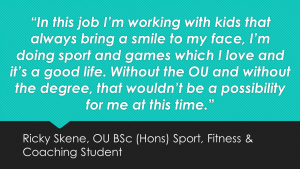 In this job I’m working with kids that always bring a smile to my face, I’m doing sport and games which I love and it’s a good life. Without the OU and without the degree, that wouldn’t be a possibility for me at this time.”
In this job I’m working with kids that always bring a smile to my face, I’m doing sport and games which I love and it’s a good life. Without the OU and without the degree, that wouldn’t be a possibility for me at this time.”
If you have been inspired by Ricky’s story and would like to study sport and fitness at the Open University, please visit our ‘Study with us’ page.
